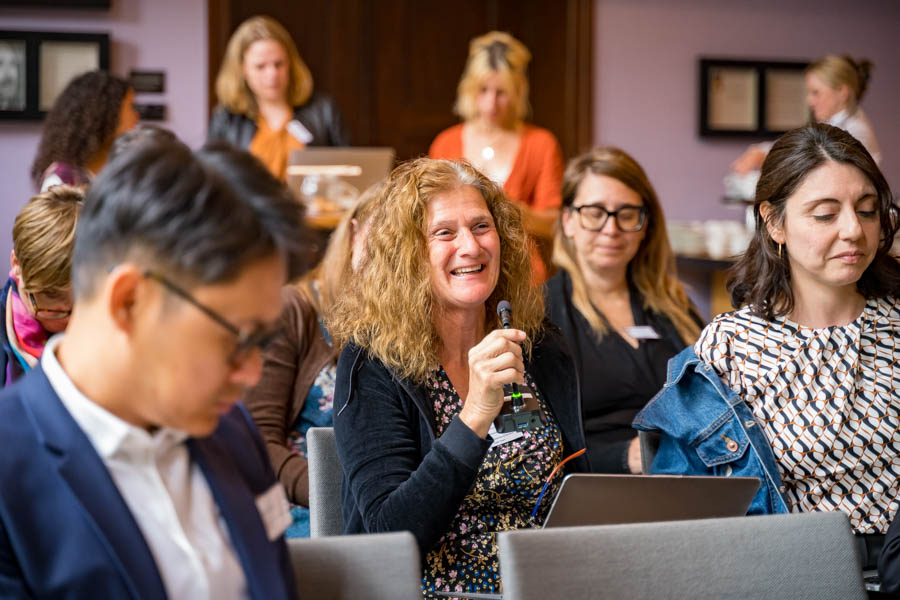Join us for an inspiring webinar dedicated to exploring the landscape of ‘RE-WIRING Leadership – Enhancing Women’s Representation in Decision-Making’. Scheduled for January 15th, 2024, from 15.00 to 17.00 (CET) / 14.00 to 16.00 (GMT), this event promises to delve deep into the heart of gender equality within leadership roles. Whether you’re attending in person at the Belle van Zuylenzaal, Academiegebouw, (Utrecht University)or joining us online, this discussion will offer invaluable insights and perspectives.
REWIRING’s core ambition is to identify, understand, and address the systemic roots of gender inequalities. RE-WIRING endeavours to reconfigure institutions, dismantling the barriers that perpetuate gender imbalances. But it’s not merely about identifying the problems; it’s about catalyzing actionable change. This project actively engages diverse stakeholders in the research process, fostering a collaborative approach to drive meaningful transformation.
Join the Conversation
We invite you to join us on January 15th, 2024, as we embark on a journey toward a more inclusive future. Together, let’s unpack the complexities, challenge the status quo, and sow the seeds for a transformative tomorrow.
During our January 15 stakeholder meeting, we will focus on the question of what effective ‘fixing the institutions’ measures, experiences and approaches can be identified in the public and private sectors and from a cross-cultural perspective, including in the countries covered by the RE-WIRING project: the Netherlands, the UK, Poland, Spain, Belgium and South Africa? Other questions to address are: how to overcome resistance against certain measures (e.g. quota) and create constructive support for change? And what role does gender play in defining leadership; how can leadership be rewired in such a way that it recognizes and values qualities and skills that are more associated with women?
Prof. Linda Senden (UU), Susan Andriessen (UU), dr. Devran Gülel and prof. Karen Johnston (both University of Portsmouth) will share the first outcomes of the literature review and country approaches. This will be followed by a round table with different front runners in the corporate, trade union and government fields who will share their approaches and experiences on enhancing female leadership, including, for instance, co-ceoship and public dashboards.
Contributors to the round table include amongst others Ebba Ohlund (CEC-European Managers), Ilze Smit (FNV; Dutch trade union), Babette Pouwels (Dutch Social and Economic Council) and Joop Schippers (University of Utrecht). We will conclude with a discussion and (for those attending in Utrecht) drinks.
Mark your calendars and be part of this pivotal conversation.
See you there!
During our January 15 stakeholder meeting, we will focus on the question what effective ‘fixing the institutions’ measures, experiences and approaches can be identified in the public and private sector and from a cross-cultural perspective, including in the countries covered by the RE-WIRING project: the Netherlands, the UK, Poland, Spain, Belgium and South Africa? Other questions to address are: how to overcome resistance against certain measures (e.g. quota) and create constructive support for change? And what role does gender play in defining leadership; how can leadership be rewired in such a way that it recognizes and values qualities and skills that are more associated with women?
Prof. Linda Senden (Utrecht University), Susan Andriessen (Utrecht University), dr. Caroline Perrin (Utrecht University), dr. Devran Gülel and prof. Karen Johnston (both University of Portsmouth) will share the first outcomes of the literature review and country approaches. This will be followed by a round table with different front runners in the corporate, trade union and government fields who will share their approaches and experiences on enhancing female leadership, including for instance co-ceoship and public dashboards.
Contributors to the round table include Ebba Öhlund (CEC European Managers), Tatyana Teplova (OECD), Babette Pouwels (Dutch Social Economic Council), Ilze Smit (FNV, major Dutch trade union), Joop Schippers (UU, Monitoring Commission Talent to the Top), Mirella Visser (Centre for Inclusive Leadership). We will conclude with a discussion and (for those attending in Utrecht) drinks.
To register, click Women in leadership – webinar (google.com)
Program
14.30 Walk-in with coffee/tea
15.00 Welcome by Linda Senden
15.05 Pitches of key findings RE-WIRING research on women’s representation and leadership
– Findings systematic literature review (Karen Johnston and Devran Gulel)
– Country-level findings (Susan Andriessen and Caroline Perrin)
15.20 Stakeholder pitches on key questions
- Policymakers and social partners perspectives: OECD (Tatyana Teplova), FNV (Ilze Smit)
- Corporate perspective: CEC (Ebba Ohlund), SER (Babette Pouwels), Monitoring Commission Talent to the Top (Joop Schippers)
16.00 Round table discussion moderated by Mirella Visser (Centre for Inclusive Leadership) - Discussion round on key question 1
- Discussion round on key question 2
16.45 Wrap-up on key take aways by Linda Senden
17.00 Drinks
Key questions for the pitches and discussion rounds:
1) What measures, rules, procedures, practices have been developed in your organisation that are aimed at achieving structural, transformative change by both
a. addressing root causes of gender inequalities, exclusion and under-representation of women in leadership positions, such root causes concerning in particular gender stereotyping and biases (e.g. stereotypical views such as ‘men take charge, women take care’ and on what good leadership requires);
AND
b. that qualify as ‘fixing the institutions’ and not as ‘fixing the women’ approaches or measures?
2) Which ones are (potentially) most effective given their (expected):
a. Impacts in terms of policy change and realisation of policy goals; more women in decision-making and leadership positions;
b. Outputs in terms of bringing about behavioural, organisational, change of culture within the institution and in people’s attitude, support and commitment to enhancing women’s representation in decision-making and leadership?
c. Capability of overcoming resistance with certain groups that are not in principle supportive of more women’s representation or recognisant of there being a problem therewith?
Overarching: in the context of the two questions here above; how can such measures, practices etc be conducive to ‘re-wiring’ leadership itself, so as to be more recognisant of qualities and skills that are more associated with women?






